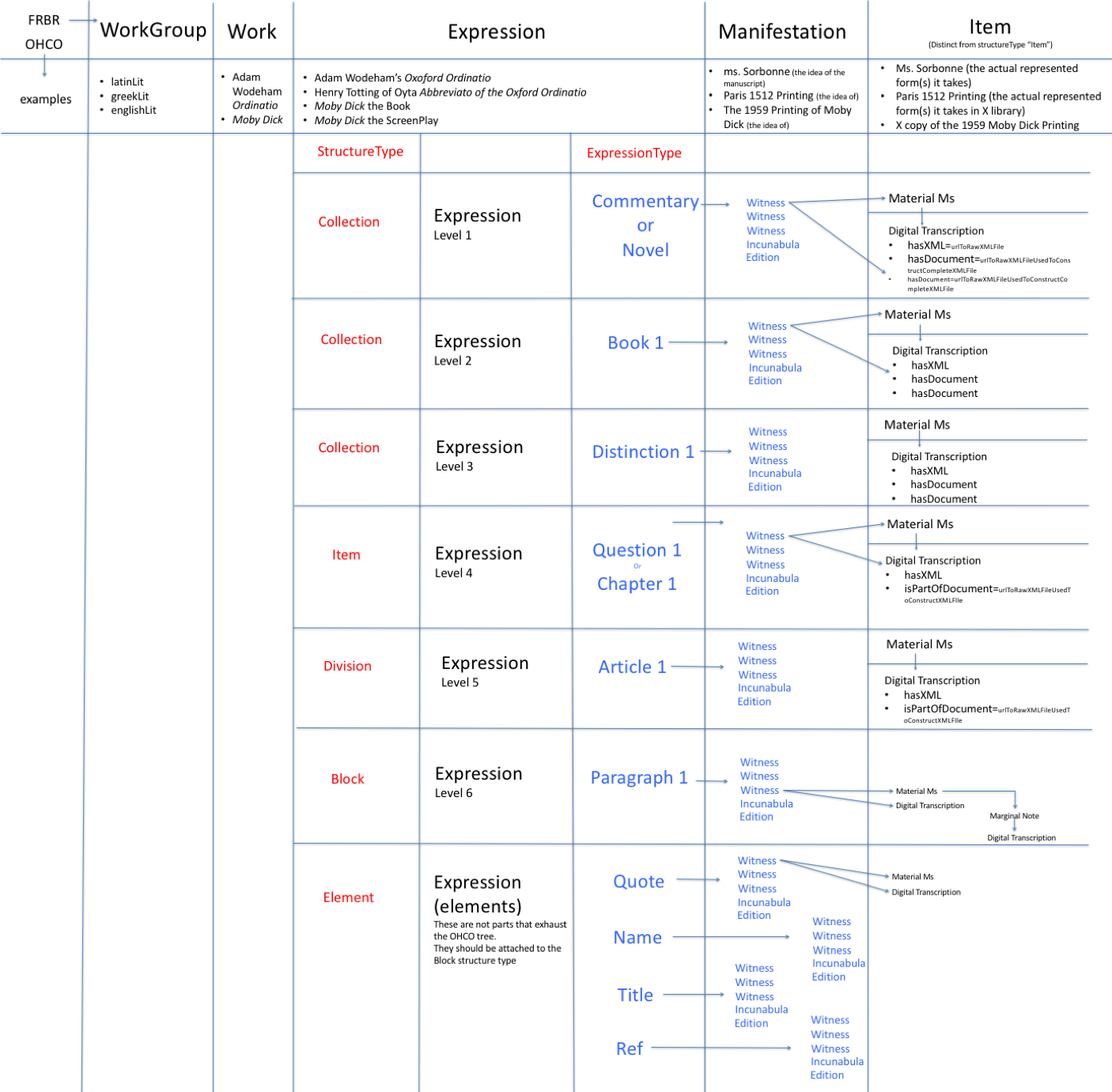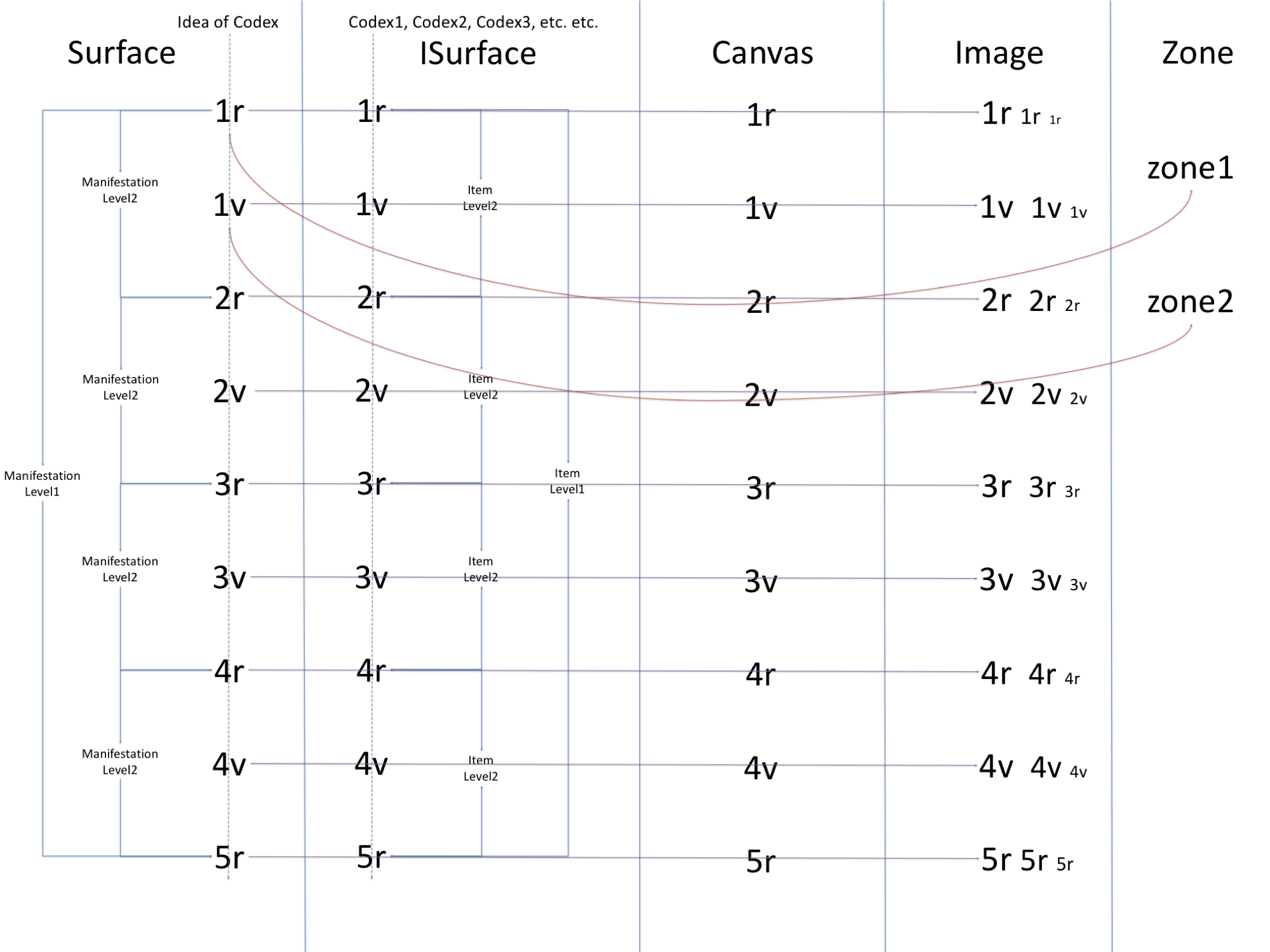Resource Types
Resource
All resources inherit the global properties of the generic resource type
- rdf:type
- etc.
- dc:title
- e.g. Wodeham Oxford Reportatio
- e.g. Wodheam Abbreviatio
- Beethoven's 9th 1st Redaction
- Beethoven's 9th 2nd Redaction
- Moby Dick the Novel
- Moby Dick the Screen Play
- dc:description
- sctap:shortId
- ldp:inbox
workGroup
- dcterms:isPartOf
- if the workGroup is not level=1 it must specify its parent part. This must be another workGroup.
- dcterms:hasPart
- a work group can take either another workGroup or a work as its direct part (or child)
- sctap:hasExpression
- every work group should list every expression contained within it, no matter what level
- sctap:level
- 1,2,3
- sctap:citation
- a string offering a best practice example of how this should be cited
Text
A super class for grouping work with expressions, manifestations, and transcriptions
Work
- role:author
- dcterms:isPartOf
- a work should indicate the immediate parent workGroup of which it is a part.
- dcterms:hasPart
- a Work (unlike a WorkGroup) can take no workGroups or Works as children and thus can only have a top level Expression as its immediate child part.
- sctap:citation
- sctap:hasExpression
- sctap:hasCanonicalExpression
- sctap:level
textItem
A super class for expressions, manifestations, and transcriptions
textItem Resources Chart

Global textItem Resource Properties
- role:author
- role:editor (is this global? I think maybe only a manifestation can have an editor)
- role:contributor
- sctap:citation
Expression
- rdf:type=http://scta.info/resource/expression
- sctap:status
- sctap:expressionType
- e.g. available expressionTypes should be enumerated in the WorkType or WorkGroupType class
- e.g. a Work within the WorkGroup where workGroupType="SentencesCommentaries" the value of expressionType given here must be one of the values of the availableExpressionType listed in that workGroupType. See WorkGroupType and WorkType below.
- sctap:hasManifestation
- sctap:hasCanonicalManifestation
- sctap:isPartOfTopLevelExpression
- all non top level Expressions should point to the top level Expression of which they are a part.
Manifestation
- sctap:manfestationType
- e.g.
- manuscript
- incunabula
- earlyEdition
- modernEdition
- bornDigitalEdition
- sctap:hasCanonicalTranscription
- sctap:hasTranscription
- sctap:isManifestationOf
- Value must be an Expression
- sctap:isOnSurface (only at item, block, and element level)
- sctap:isOnZone (only block, and element level)
Transcription
- sctap:transcriptionType
- e.g.
- diplomatic
- critical
- translation
- sctap:isTranscriptionOf
- sctap:hasXML
- sctap:hasDocument
- sctap:plaintext
- sctap:status
- Version Chain Properties
- A transcription can forms part of a version chain, allows select transcriptions to be linked together in a version chain.
- A version chain is not an RDF class, but an idea of transcriptions resources linked together by the following properties.
- sctap:hasAncestor
- indicates all previous versions within a version chain. An transcription MAY have many
hasAncestorproperties
- indicates all previous versions within a version chain. An transcription MAY have many
- sctap:hasDescendant
- indicates all subsequent versions within a version chain. A transcription MAY have many
hasDescendantproperties
- indicates all subsequent versions within a version chain. A transcription MAY have many
- sctap:hasSuccessor
- indicates the transcription immediately following this this transcription within the version chain.
A transcription MAY have ONLY one
hasSuccessorproperty
- indicates the transcription immediately following this this transcription within the version chain.
A transcription MAY have ONLY one
- sctap:hasPredecessor
- indicates the transcription immediately preceding this transcription within the version chain. A transcription MAY have ONLY one
hasPredecessorproperty
- indicates the transcription immediately preceding this transcription within the version chain. A transcription MAY have ONLY one
- sctap:isVersionDefault
- Within a version chain, a transcription can be identified as the
versionDefault. TheversionDefault=trueassertion indicates that this transcription that will be associated with a manifestation via thehasTranscriptionproperty and will be used for extraction purposes in processing. Only one transcription within a version chain should be the object of a manifestation'shasTranscriptionproperty, while each transcription within the version chain has aisTranscriptionOfproperty.
- Within a version chain, a transcription can be identified as the
- sctap:isHeadTranscription
- No matter which version is the listed as the
versionDefaulttheisHeadTranscription=trueindicates which transcription stands at the top of the versionChain. the transcription with theisHeadTranscription=truewill always have the highestversionOrderNumberwithin a series
- No matter which version is the listed as the
- sctap:versionOrderNumber
- the
versionOrderNumberindicates the order of a transcription within a version chain. The first transcription will always have the version number "0001" and the head transcription will always have the highest number within the series.
- the
- sctap:versionNo
- A version Number 1.0.0 or 1.0.0. Ideally version number will match a git tag or or part of a git tag.
- sctap:versionLabel
- A human readable version label designed for display.
Note: The following are not classes but critical properties that that textItem classes can take that effectively divide textItem classes into subclasses
--
Global Structure properties
- sctap:structureType
- structureCollection
- sturctureItem
- sturctureBlock
- sturctureElement
- dcterms:isPartOf
- a top level expression should point to the immediate parent Work (or WorkGroup) that contains the top level expression as a direct child
- dcterms:hasPart
- the top level expression should list the immediate 2nd level child Expressions
- isPartOfTopLevelStructure
- alias of isPartOfTopLevelExpression, isPartOfTopLevelManifestation, isPartOfTopLevelTranscription
- applies at every level accept structureCollection level 1
- sctap:next
- next should point to the next expression on the same level of the content hierarchy
- obviously, a top level expression would not a have a next property because there is be definition now sibling of Expression of a top level Expression
- sctap:previous
- next should point to the next expression on the same level of the content hierarchy
- again, previous property does not apply to a top level Expression
- sctap:sectionOrderNumber
- the order sequence position number among sibling Expression parts
- sctap:totalOrderNumber
- the order sequence position number among all Expression parts on this level.
- sctap:level
- the level of the expression within the Expression hierarchy
TopLevelStructureCollection
- sctap:hasStructureItem
StructureCollection
- sctap:hasStructureItem
StructureItem
- sctap:hasStructureBlock
StructureDivision
- sctap:hasStructureBlock
StructureBlock
- sctap:isPartOfStructureItem
- sctap:hasStructureElement
StructureElement
- sctap:isPartOfStructureBlock
Virtual textItem Classes
Note: The following are not explicitly classes, but could be considered sub classes that are the resultant combination of a textItem class and a structure type
TopLevelCollectionExpression
ExpressionCollection
ExpressionItem
ExpressionBlock
ExpressionElement
TopLevelCollectionManifestation
ManifestationCollection
ManifestationItem
ManifestationBlock
ManifestationElement
TopLevelCollectionTranscription
TranscriptionCollection
TranscriptionItem
TranscriptionBlock
TranscriptionElement
marginalNote
- isPartOfStructureBlock
- isPartOfTopLevelManifestation
- structureType=structureElement
- structureElementType=structureElementMarginalNote
- structureElementText
- isOnSurface
- isOnZone
person
- hasInstance
- personType
- owl:sameAs (this should be global)
materialResource
A super class for materialResource subclasses

| MaterialManifestation | MatieralItem |
|---|---|
| Codex | icodex |
| Quire | iquire |
| Folio | ifolio |
| Surface | isurface |
| zone | izone |
codex
- sctap:hasCanonicalCodexItem
- sctap:hasSurface
- range: sctar:surface
dc:hasPart
- range: e.g, sctar:quire
structureType=structureCollection
quire
- sctap:hasCanonicalQuireItem
- sctap:hasSurface
- range: sctar:surface
- dc:hasPart
- range: e.g sctar:folio, surface
- materialStructureType=materialStructureCollection
- isMemberOf
- each ancestor of this quire (codex should be listed)
folio
- sctap:hasCanonicalFolioItem
- sctap:hasSurface
- range: sctar:surface
- dc:hasPart
- range: sctar:quire or sctar:codex
- materialStructureType=materialStructureCollection
- isMemberOf
- each ancestor of this folio (quire, codex should be listed)
surface
- sctap:isPartOfCodex
- sctap:next
- sctap:previous
- dc:isPartOf
- e.g. folio, quire, or codex
- dc:hasPart
- range: directChildren
- sctap:hasZone
- all descendant zones at any level
- materialStructureType=materialStructureItem
- isMemberOf
- each ancestor of this surface (folio, quire, codex should be listed)
zone
- sctap:zoneType
- marginRight
- marginCenter
- marginLeft
- marginBottom
- marginTop
- column
- line
- general
- sctap:isPartOfSurface
- inverse of hasZone
- dc:isPartOf
- range: sctar:surface, or line is part of column, marginal note could be part of margin
- materialStructureType=materialStructureBlock
- height
- width
- lrx
- lry
- ulx
- uly
isMemberOf
- each ancestor of this zone (surface, folio, quire, codex should be listed)
Note on position/order
- sctap:order?
- default=1, where there is more than one zone for a given resource, (for example a paragraph that crosses from one column to the next) the zone should be given a order number so that the zones can be ordered correctly.
- I think this should be removed and the manifestation pointing to more than one zone should indicate the order using a blank node, e.g hasZone->:bn->zone and order
- sctap:order?
icodex
- canvasPagedType
- hasOfficialManifest
- isCodexItemOf
- sctap:hasISurface
- range: sctar:isurface
- dc:hasPart
- range: sctar:iquire
- materialStructureType=materialStructureCollection